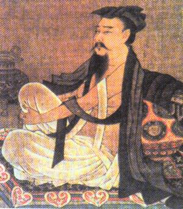 Ruǎn Jí was a Chinese musician and poet who lived during the 3rd century, a time also known as the
Ruǎn Jí was a Chinese musician and poet who lived during the 3rd century, a time also known as the

He is recorded as being a member of a group of musicians and writers called the

One of his most famous pieces of work was a Guqin melody whose title in English is

It is believed that he was born during the year 210, in the Cao Wei kingdom. His father was a learned man called Ruǎn Yu who was one of the

These were turbulent, even dangerous times, as his kingdom struggled with the other two of that time for supremacy in Ancient China. In later life Ruǎn Jí survived for as long as he did by often adopting the persona of an eccentric, or a drunk, thus appearing to pose no threat to anyone. However, there was much rivalry between the different clans and families who all struggled for stability amidst constant political upheaval.
He grew up, despite the difficulties, during a period of burgeoning spirituality with new influences coming from abroad, such as Buddhism, and many such as Ruǎn Jí exploring the art of lyrical poetry. Artists were creating fine pieces of work, both on canvas and in new architecture, and an overwhelming spirit of “grace and freedom” could be enjoyed by many during this exciting epoch. Curiously those of the peasant class were often seen as symbols of purity while those who plied their trade in government or royal court circles were said to live their lives in the “dust and dirt”.
Ruǎn Jí and his fellow writers of the “Bamboo Grove” often gathered together in a house in Shanyang to swap ideas while freely imbibing alcoholic drinks, and experimenting with narcotics such as a fairly toxic substance called Cold Food Powder. This, combined with the playing of spiritual music, would create a strong feeling of well-being, at least in the short term. These sessions did, however, encourage the creation of poetry, verses that were often inspired by the idea of freedom and the quest for a better world. Officialdom looked down on groups such as this but the members of the Seven Sages of the Bamboo Grove spurned such concepts of public service, in favour of living a life that avoided politics altogether where personal enjoyment and freedom were much more important.
Ruǎn Jí was considered to be the most important poet of his time, putting his whole life and soul into his work. His imagery was sometimes colourful, describing flowers that blossom in sad places such as graveyards in the following lines:

It seems that in writing such lines he could turn the sadness of death into something more hopeful, simply by describing a pretty flower.
Conversely, he would also often write in a mournful tone about loneliness and sorrow, two states of mind that can exist in everyone’s life at some point. Take for example the following lines from the first poem in a collection called Poems from my Heart:

Music was becoming more and more important in the China of the 3rd century and Ruǎn Jí saw in music an “ideal of harmony”. For him, music was as nature – all around, all powerful and capable of taking a person into a perfect state of harmony and serenity.
It is believed that Ruǎn Jí died at the age of 53, sometime during the year 263.

